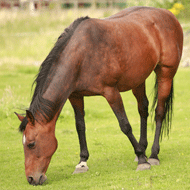
Test to be used with saliva samples
A diagnostic blood test for the assessment of encysted small strongyle larval burdens in horses is being developed by scientists at the Moredun Group.
The novel test detects antibodies to larval cyathostomins encysted in the gut of infected horses.
Working in collaboration with Austin Davis Biologics, Moredun will develop the test for use with saliva samples.
If successful, this would simplify the collection process, enabling horse owners to take samples directly from their horse for analysis.
“We are delighted to collaborate with Austin Davis Biologics to further develop this test,” commented Moredon Group leader Professor Jacqui Matthews. “The company has significant experience in the development of saliva-based tests for the equine market.”
Small strongyles are a group of parasites commonly found in the gut of grazing horses. Typically the higher the worm burden, the higher the risk of clinical disease in the horse.
Infestation can lead to a dull coat, weight loss, colic, severe diarrhoea and death.
For the early stages of this collaborative project, scientists are joining forces with equine veterinary practices to collect matched samples of blood and saliva.
After initial development, saliva tests will be compared with the previously validated blood test.
“We are very pleased to be working with Moredun on this exciting project,” added Dr Corrine Austin, of Austin Davis Biologics.
“A saliva test for encrusted cyathostomins will provide horse owners, equine veterinarians and animal medicines advisors with a new tool to target the treatment of cyathostomin infections in horses.”



 The veterinary mental health charity Vetlife is inviting the veterinary community to join it for a sponsored cold-water dip.
The veterinary mental health charity Vetlife is inviting the veterinary community to join it for a sponsored cold-water dip.